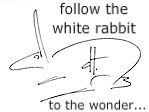A fantastic excerpt from MacDonald's
The Princess & Curdie (the sequel to
The Princess & The Goblin)
[Curdie had just killed a white pigeon and right after doing so begins to feel a great regret and remorse and is reminded of Princess Irene’s great-great-grandmother whose bird it might have been. Curdie sets out to find the great-great-grandmother and make amends.]
When Curdie saw how distressed [the great-great- grandmother] was he grew sorrier still, and said:
‘I didn’t mean to do any harm, ma’am. I didn’t think of it being yours.’
‘Ah, Curdie! If it weren’t mine, what would become of it now?’ she returned. ‘You say you didn’t mean any harm: did you mean any good, Curdie?
‘No,’ answered Curdie.
‘Remember, then, that whoever does not mean good is always in danger of harm. But I try to give everybody fair play; and those that are in the wrong are in far more need of it always than those who are in the right: they can afford to do without it. Therefore I say for you that when you shot that arrow you did not know what a pigeon is. Now that you do know, you are sorry. It is very dangerous to do things you don’t know about.’
‘But please, ma’am – I don’t mean to be rude or to contradict you,’ said Curdie, ‘but if a body was never to do anything but what he knew to be good, he would have to live half of his time doing nothing.’
‘There you are mistaken,’ said the old quavering voice. ‘How little you must have thought! Why, you don’t seem even to know the good of the things you are constantly doing. Now don’t mistake me. I don’t mean you are good for doing them. It is a good thing to eat your breakfast, but you don’t fancy it’s very good of you to do it. The thing is good—not you.’
Curdie laughed.
‘There are a great many more good things than bad things to do. Now tell me what bad things you have done today besides this sore hurt to my little white friend.’
While she talked Curdie had sunk into a sort of reverie, in which he hardly knew whether it was the old lady or his own heart that spoke. And when she asked him that question, he was at first much inclined to consider himself a very good fellow on the whole. ‘I really don’t think I did anything else that was very bad all day,’ he said to himself. But at the same time he could not honestly feel what he was worth standing up for. All at once a light seemed to break in upon his mind, and he woke up and there was the withered little atomy of the old lady on the other side of the moonlight, and there was the spinning wheel singing on and on in the middle of it!
‘I know now, ma’am; I understand now,’ he said. ‘Thank you, ma’am, for spinning it into me with your wheel. I see now that I have been doing wrong the whole day, and such a many days besides! Indeed, I don’t know when I ever did right, and yet it seems as if I had done right some time and forgotten how. When I killed your bird I did not know I was doing wrong, just because I was always doing wrong, and the wrong had soaked all through me.’
‘What wrong were you doing all day, Curdie? It is better to come to the point, you know,’ said the old lady, and her voice was gentler even than before.
‘I was doing the wring of never wanting or trying to be better. And now I see that I have been letting things go as they would for a long time. Whatever came into my head I did, and whatever didn’t come into my head I didn’t do. I never sent anything away, and never looked out for anything to come. I haven’t been attending to my mother—or my father either. And now I think of it, I know I have often seen them looking troubled, and I have never asked them what was the matter. And now I see, too, that I did not ask because I suspected it had something to do with me and my behaviour, and didn’t want to hear the truth. And I know I have been grumbling at my work, and doing a hundred other things that are wrong.’
‘You have got it, Curdie,’ said the old lady, in a voice that sounded almost as if she had been crying. ‘When people don’t care to be better they must be doing everything wrong. I am so glad you shot my bird!’
‘Ma’am!’ exclaimed Curdie. ‘How
can you be?’
‘Because it has brought you to see what sort your were when you did it, and what sort you will grow to be again, only worse, if you don’t mind. Now that you are sorry, my poor bird will be better. Look up my dovey.’
The pigeon gave a flutter, and spread out one of its red-spotted wings across the old woman’s bosom.
‘I will mend the little angel,’ she said, ‘and in a week or two it will be flying again. So you may ease your heart about the pigeon.’
‘Oh, thank you! Thank you!’ cried Curdie. ‘I don’t know how to thank you.’
‘Then I will tell you. There is only one way I care for. Do better, and grow better, and be better. And never kill anything without a good reason for it.’
‘Ma’am, I will go and fetch my bow and arrows, and you shall burn them yourself.’
‘I have no fire that would burn your bow and arrows, Curdie.’
‘Then I promise you to burn them all under my mother’s porridge pot tomorrow morning.’
‘No, no, Curdie. Keep them, and practice with them every day, and grow a good shot. There are plenty of bad things that want killing, and a day will come when they will prove useful. But I must see first wheterh you will do as I tell you.’
pgs 25-28

























